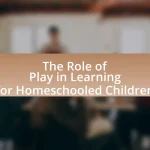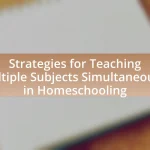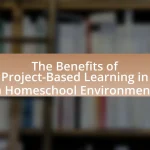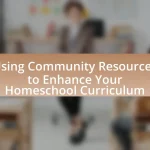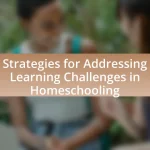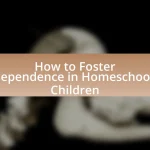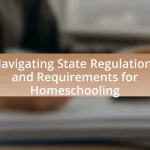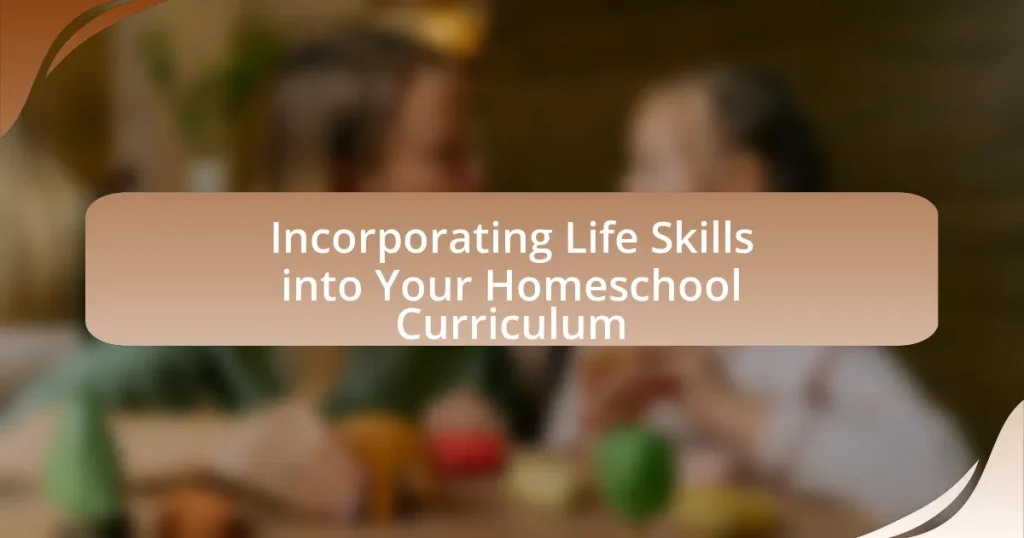Incorporating life skills into a homeschool curriculum involves integrating practical abilities such as financial literacy, communication, problem-solving, and time management, which are essential for students’ personal and professional success. The article emphasizes the importance of these skills for homeschoolers, highlighting their role in fostering independence and adaptability. It outlines specific life skills to prioritize, methods for integrating them into existing subjects, and the benefits of project-based learning. Additionally, it addresses challenges in implementation, strategies for effective teaching, and available resources to support life skills education, ultimately demonstrating how these skills contribute to a child’s overall development and readiness for real-world challenges.
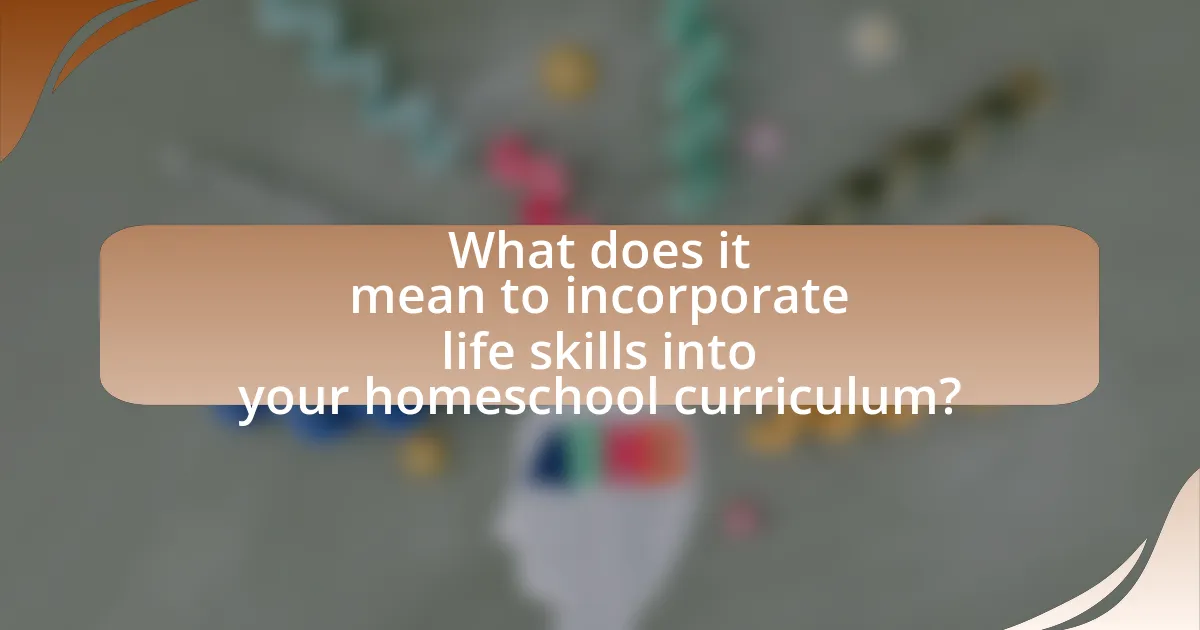
What does it mean to incorporate life skills into your homeschool curriculum?
Incorporating life skills into your homeschool curriculum means integrating practical abilities that prepare students for everyday challenges and responsibilities. This approach includes teaching skills such as financial literacy, communication, problem-solving, and time management, which are essential for personal and professional success. Research indicates that students who learn life skills alongside traditional academic subjects demonstrate improved self-efficacy and adaptability in real-world situations, as highlighted in the study “The Importance of Life Skills Education” by the National Association of School Psychologists.
Why are life skills important for homeschoolers?
Life skills are important for homeschoolers because they equip students with essential competencies needed for daily living and future success. These skills, such as communication, problem-solving, and time management, foster independence and adaptability in various life situations. Research indicates that students who develop life skills are better prepared for real-world challenges, enhancing their ability to navigate social interactions and professional environments effectively. For instance, a study by the World Health Organization highlights that life skills education can lead to improved mental health and social outcomes, demonstrating the critical role these skills play in holistic development.
What specific life skills should be prioritized in a homeschool setting?
In a homeschool setting, specific life skills that should be prioritized include financial literacy, effective communication, critical thinking, problem-solving, and time management. Financial literacy equips students with the knowledge to manage money, budget, and understand investments, which is essential for adult life. Effective communication skills enable individuals to express themselves clearly and build relationships, while critical thinking and problem-solving skills foster the ability to analyze situations and make informed decisions. Time management teaches students how to prioritize tasks and meet deadlines, which is crucial for academic success and future employment. These skills are supported by educational research indicating that life skills education enhances overall student development and prepares them for real-world challenges.
How do life skills contribute to a child’s overall development?
Life skills significantly contribute to a child’s overall development by enhancing their ability to navigate daily challenges and fostering independence. These skills, which include problem-solving, communication, and emotional regulation, equip children with the tools necessary to interact effectively with their environment and peers. Research indicates that children who develop strong life skills demonstrate improved academic performance, better social relationships, and increased resilience. For instance, a study published in the Journal of Educational Psychology found that students with well-developed life skills showed a 20% increase in academic achievement compared to their peers lacking these skills. This evidence underscores the critical role life skills play in shaping a child’s holistic growth and success.
How can life skills be integrated into existing subjects?
Life skills can be integrated into existing subjects by embedding practical applications and real-world scenarios within the curriculum. For instance, in mathematics, students can learn budgeting and financial literacy through projects that involve managing a household budget or planning a small business. In science classes, experiments can be designed to teach problem-solving and critical thinking by requiring students to hypothesize, test, and analyze results. Additionally, language arts can incorporate life skills by having students engage in persuasive writing or public speaking exercises that enhance communication abilities. Research indicates that integrating life skills into academic subjects not only improves student engagement but also enhances retention of knowledge, as students see the relevance of their learning in everyday life.
What subjects lend themselves well to life skills integration?
Subjects that lend themselves well to life skills integration include mathematics, science, language arts, social studies, and health education. Mathematics teaches budgeting and financial literacy, while science fosters critical thinking and problem-solving skills. Language arts enhance communication and interpersonal skills, and social studies promote understanding of civic responsibility and cultural awareness. Health education emphasizes personal well-being and decision-making regarding health choices. These subjects provide practical applications that help students develop essential life skills necessary for everyday living.
How can project-based learning enhance life skills education?
Project-based learning enhances life skills education by providing students with hands-on experiences that foster critical thinking, collaboration, and problem-solving abilities. This approach allows learners to engage in real-world projects, which require them to apply knowledge in practical situations, thereby developing essential skills such as communication, time management, and adaptability. Research indicates that students involved in project-based learning demonstrate improved engagement and retention of information, as they are more likely to connect their learning to real-life contexts. For instance, a study published in the “Journal of Educational Psychology” found that students participating in project-based learning scored higher on assessments of critical thinking and collaboration compared to those in traditional learning environments.
What challenges might arise when incorporating life skills?
Incorporating life skills into a homeschool curriculum may present challenges such as lack of resources, varying student engagement, and difficulty in assessment. Limited access to practical materials or community programs can hinder effective teaching of life skills, as evidenced by a study from the National Center for Education Statistics, which found that 30% of homeschool families reported challenges in finding appropriate resources. Additionally, students may exhibit differing levels of interest and motivation, complicating the implementation of a standardized life skills program. Lastly, assessing the mastery of life skills can be subjective and complex, as traditional testing methods may not adequately capture a student’s practical abilities.
How can parents overcome resistance to life skills education?
Parents can overcome resistance to life skills education by actively engaging their children in the learning process and demonstrating the practical benefits of these skills. By incorporating real-life scenarios and hands-on activities, parents can illustrate how life skills apply to everyday situations, making the learning experience relevant and relatable. Research shows that experiential learning increases retention and interest; for instance, a study published in the Journal of Educational Psychology found that students who participated in hands-on activities were more likely to retain information and show enthusiasm for the subject matter. Additionally, fostering an open dialogue about the importance of life skills can help children understand their value, thereby reducing resistance.
What resources are available to support life skills integration?
Resources available to support life skills integration include educational programs, online courses, and community workshops. Educational programs such as the “Life Skills Curriculum” by the National Center for Learning Disabilities provide structured lessons on essential skills. Online platforms like Coursera and Khan Academy offer courses focused on practical skills such as financial literacy and time management. Additionally, community workshops often organized by local nonprofits or educational institutions provide hands-on experiences in areas like cooking, budgeting, and job readiness. These resources collectively enhance the integration of life skills into homeschooling by providing diverse learning opportunities and practical applications.
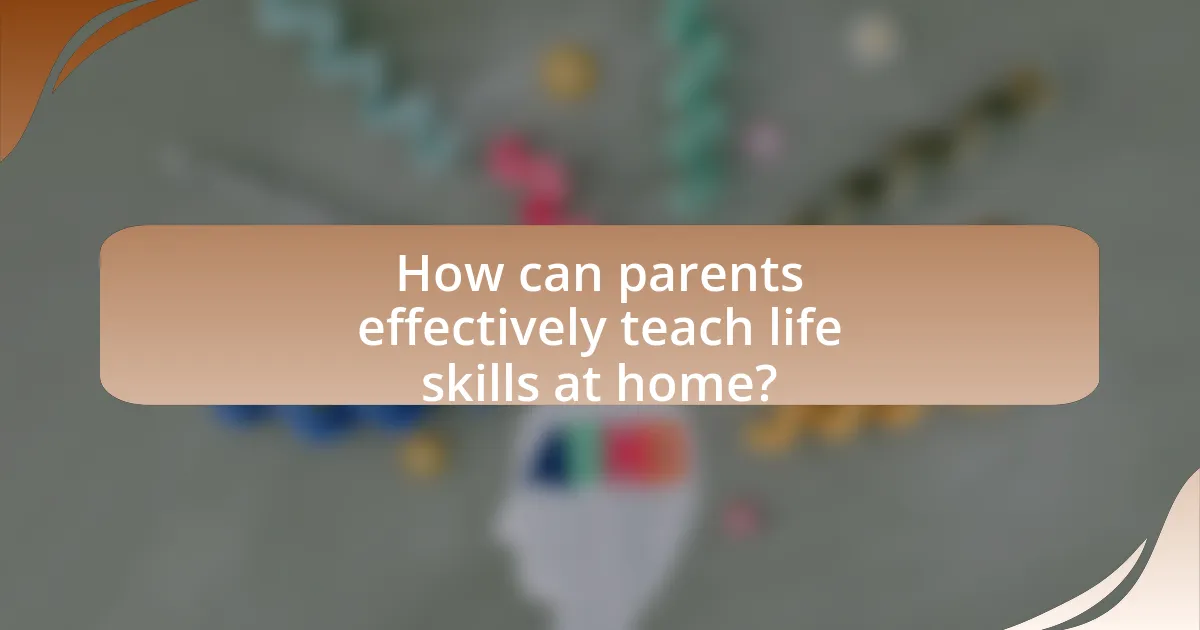
How can parents effectively teach life skills at home?
Parents can effectively teach life skills at home by integrating practical activities into daily routines. Engaging children in cooking, budgeting, and household chores fosters essential skills such as time management, financial literacy, and responsibility. Research indicates that hands-on experiences enhance learning retention; for instance, a study by the National Center for Education Statistics found that students who participate in practical life skills training demonstrate improved problem-solving abilities and independence. By creating a structured environment where life skills are practiced regularly, parents can ensure their children are well-prepared for real-world challenges.
What strategies can be used to teach life skills effectively?
Effective strategies to teach life skills include experiential learning, project-based activities, and role-playing scenarios. Experiential learning allows students to engage in real-life situations, enhancing their problem-solving and decision-making abilities. Project-based activities encourage collaboration and critical thinking, as students work together to complete tasks that mimic real-world challenges. Role-playing scenarios provide a safe environment for practicing social interactions and conflict resolution, which are essential life skills. Research shows that hands-on approaches significantly improve retention and application of skills, making these strategies particularly effective in a homeschool curriculum focused on life skills.
How can real-life experiences be utilized in teaching life skills?
Real-life experiences can be utilized in teaching life skills by integrating practical activities that reflect everyday situations. For instance, engaging students in cooking, budgeting, or community service allows them to apply theoretical knowledge in real contexts, enhancing their understanding and retention of essential skills. Research indicates that experiential learning, as outlined by Kolb’s Experiential Learning Theory, significantly improves skill acquisition and personal development, demonstrating that hands-on experiences lead to better outcomes in life skills education.
What role does modeling behavior play in teaching life skills?
Modeling behavior plays a crucial role in teaching life skills by providing learners with concrete examples of how to apply these skills in real-life situations. When educators or parents demonstrate behaviors such as effective communication, problem-solving, and decision-making, they create a framework for students to emulate. Research indicates that observational learning, as described by Albert Bandura’s Social Learning Theory, shows that individuals are more likely to adopt behaviors they have seen modeled by others. This process reinforces the understanding and application of life skills, making them more relatable and easier to grasp for learners.
How can parents assess their child’s life skills development?
Parents can assess their child’s life skills development by observing their ability to perform daily tasks, communicate effectively, and solve problems independently. Regularly engaging children in activities such as cooking, budgeting, and time management allows parents to evaluate their proficiency in these essential skills. Additionally, using checklists or assessment tools specifically designed for life skills can provide a structured approach to measure progress. Research indicates that children who participate in hands-on activities demonstrate improved life skills, as noted in studies by the American Psychological Association, which highlight the correlation between practical experience and skill acquisition.
What tools can be used for evaluating life skills progress?
Tools for evaluating life skills progress include observation checklists, self-assessment surveys, and performance-based assessments. Observation checklists allow educators to systematically track specific skills demonstrated by students in real-life situations, providing concrete evidence of progress. Self-assessment surveys enable students to reflect on their own skills and identify areas for improvement, fostering self-awareness and personal growth. Performance-based assessments require students to apply their life skills in practical scenarios, offering measurable outcomes that can be analyzed for effectiveness. These tools collectively provide a comprehensive framework for assessing life skills development in a homeschool curriculum.
How can feedback be provided to encourage improvement?
Feedback can be provided to encourage improvement by offering specific, actionable suggestions that highlight both strengths and areas for growth. This approach ensures that learners understand what they are doing well and what needs enhancement, fostering a growth mindset. Research indicates that feedback that is timely and constructive leads to better learning outcomes, as it allows individuals to make adjustments in real-time, thereby reinforcing positive behaviors and correcting mistakes effectively. For instance, a study published in the “Journal of Educational Psychology” by Hattie and Timperley (2007) emphasizes that feedback should be clear, focused on the task, and aimed at the learner’s self-regulation to maximize its impact on improvement.
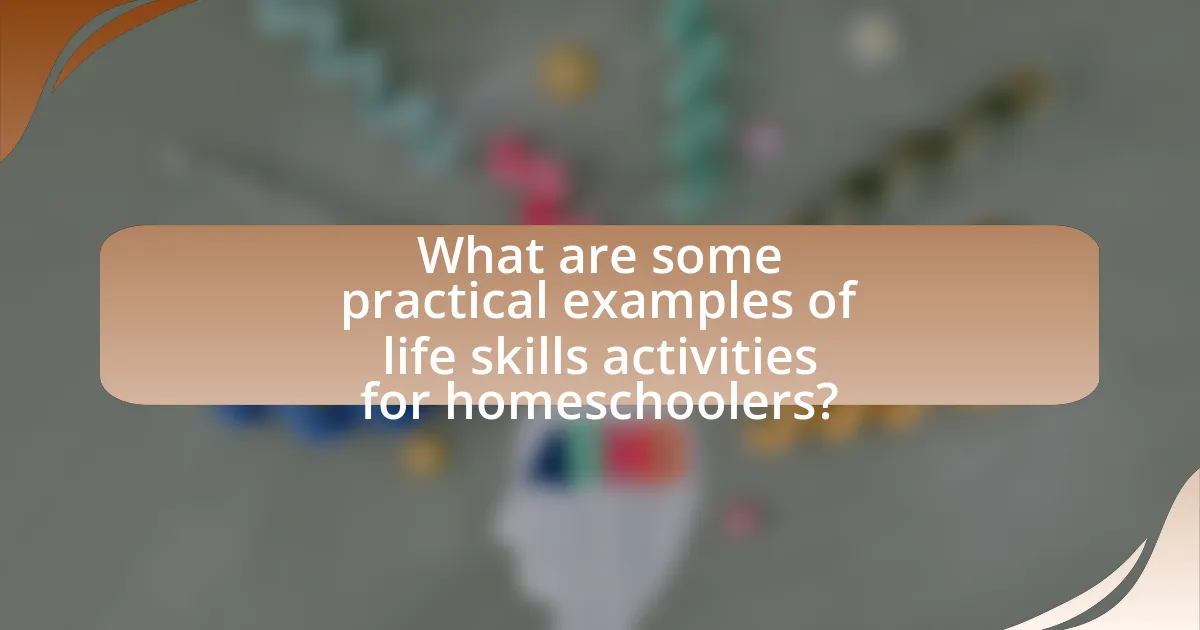
What are some practical examples of life skills activities for homeschoolers?
Practical examples of life skills activities for homeschoolers include cooking, budgeting, gardening, and basic home maintenance. Cooking teaches meal preparation and nutrition, while budgeting helps students understand financial management through activities like tracking expenses and creating a savings plan. Gardening provides lessons in responsibility and biology, as students learn to care for plants and understand ecosystems. Basic home maintenance activities, such as cleaning, organizing, and simple repairs, foster independence and problem-solving skills. These activities are essential for developing practical skills that students will use throughout their lives.
What types of activities can help develop essential life skills?
Activities that can help develop essential life skills include problem-solving tasks, teamwork exercises, financial literacy projects, and practical life tasks such as cooking and budgeting. Problem-solving tasks, like puzzles or real-life scenarios, enhance critical thinking and decision-making abilities. Teamwork exercises, such as group projects or sports, foster collaboration and communication skills. Financial literacy projects, including managing a mock budget or learning about saving and investing, build financial responsibility. Practical life tasks, such as cooking meals or planning a family event, teach organization and self-sufficiency. These activities are supported by educational research indicating that hands-on experiences significantly improve skill acquisition and retention in learners.
How can cooking and budgeting be integrated into the curriculum?
Cooking and budgeting can be integrated into the curriculum by designing hands-on projects that combine meal preparation with financial planning. For instance, students can create a weekly meal plan that includes budgeting for ingredients, allowing them to practice both culinary skills and financial literacy. Research indicates that experiential learning, such as cooking classes that incorporate budgeting, enhances retention of practical skills and knowledge, making it an effective educational approach.
What community service opportunities can enhance life skills learning?
Community service opportunities that can enhance life skills learning include volunteering at local food banks, participating in environmental clean-up projects, and assisting in community centers. These activities foster skills such as teamwork, communication, and problem-solving. For instance, volunteering at a food bank requires individuals to collaborate with others, manage time effectively, and develop empathy through direct interaction with diverse community members. Research indicates that engaging in community service can significantly improve social skills and self-efficacy, as evidenced by a study published in the Journal of Community Psychology, which found that participants reported increased confidence and interpersonal skills after volunteering.
How can technology support life skills education?
Technology can support life skills education by providing interactive platforms that enhance learning experiences. For instance, online simulations and virtual environments allow learners to practice real-world scenarios, such as budgeting or conflict resolution, in a safe space. Research indicates that students using technology for life skills training show improved engagement and retention of information, as evidenced by a study published in the Journal of Educational Technology, which found that 85% of participants reported increased confidence in applying life skills after using digital tools. Additionally, mobile applications can offer personalized learning paths, enabling students to progress at their own pace, further reinforcing the acquisition of essential life skills.
What online resources are available for teaching life skills?
Online resources available for teaching life skills include websites like Life Skills for Kids, which offers structured lessons on essential skills such as cooking, budgeting, and personal hygiene. Additionally, platforms like Khan Academy provide free courses that cover financial literacy and career readiness, equipping learners with practical knowledge. The National Center for Learning Disabilities also offers resources tailored for teaching life skills to students with diverse learning needs, ensuring accessibility and effectiveness. These resources are validated by their widespread use in educational settings and positive feedback from educators and parents.
How can apps and games be used to reinforce life skills?
Apps and games can reinforce life skills by providing interactive and engaging environments that simulate real-life scenarios. These digital tools often incorporate problem-solving tasks, decision-making challenges, and social interactions, which are essential components of life skills development. For instance, educational games like “Minecraft: Education Edition” promote teamwork, creativity, and resource management, while apps such as “Khan Academy” enhance critical thinking and self-directed learning. Research indicates that gamified learning experiences can improve retention rates and engagement, making them effective for teaching practical skills.
What are some best practices for incorporating life skills into your homeschool curriculum?
To effectively incorporate life skills into your homeschool curriculum, integrate practical activities that reflect real-world scenarios. For instance, teaching budgeting through hands-on exercises like managing a family grocery budget can enhance financial literacy. Research indicates that experiential learning, such as cooking or gardening, not only teaches essential skills but also improves retention and engagement among students. Additionally, fostering problem-solving through project-based learning, where students tackle community issues, can develop critical thinking and collaboration skills. These methods align with educational standards that emphasize the importance of life skills in holistic education.

